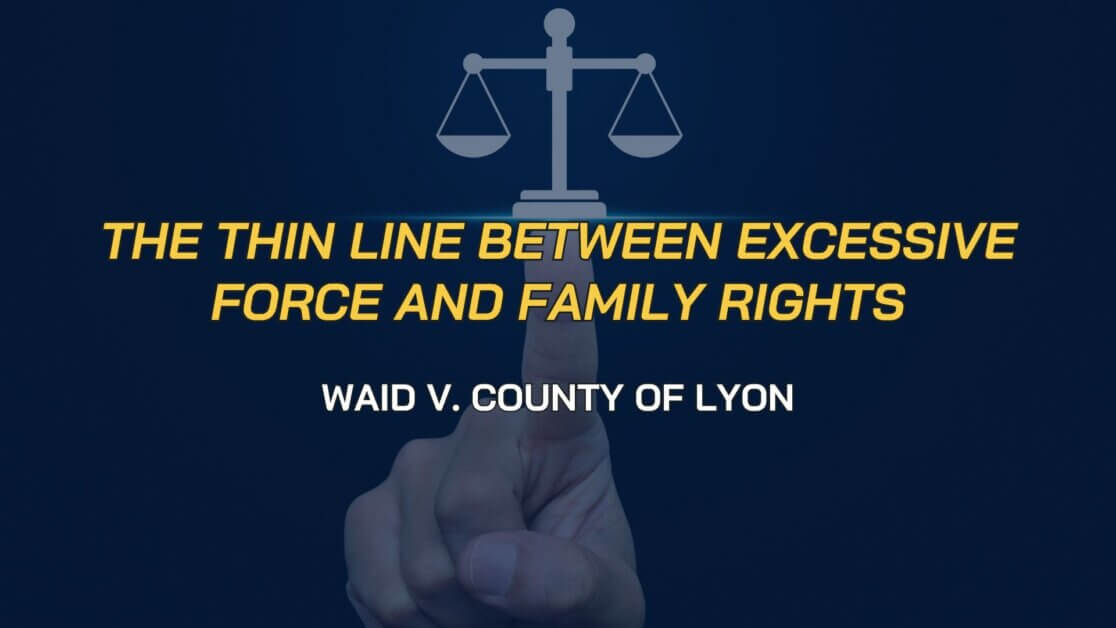After a very quiet 2019-2020 Supreme Court session on the topics of Law Enforcement operations, 2020-2021 SCOTUS session was packed with cases that are important to Public Safety operations.
The following Supreme Court of the United States cases will be reviewed in this webinar:
Lombardo v. City of St. Louis, Missouri, (6-3 Per Curiam opinion on June 28, 2021)
The Court vacated and remanded the Eighth Circuit Court of Appeals. Because it is unclear in this excessive force case whether the Eighth Circuit incorrectly thought the use of a prone restraint is per se constitutional so long as an individual appears to resist officers’ efforts to subdue him, the U.S. Court of Appeals for the Eighth Circuit’s judgment is vacated, and the case is remanded to give the lower court the opportunity in the first instance to employ the careful, context-specific analysis required by this court’s excessive force precedent.
Standing Akimbo, LLC v. United States, (June 28, 2021)
Supreme Court Justice Thomas Clarence released a statement pertaining to the federal ban on the cultivation and use of marijuana within states where he noted that it “may no longer be necessary or proper.” This statement was made in connection with the denial of a petition for a writ of certiorari to the Supreme Court of the United States (SCOTUS) in the case of Standing Akimbo, LLC v. United States.
Lange v. California, (9-0 Opinion on June 23, 2021)
The Court vacated and remanded the Court of Appeal of California, First Appellate District. The Court held that, under the Fourth Amendment, pursuit of a fleeing misdemeanor suspect does not always or categorically qualify as an exigent circumstance justifying a warrantless entry into a home and is dependent on the facts.
Greer v. United States, United States v. Gary, (8-1 Opinion on June 14, 2021)
The Court affirmed the Eleventh Circuit Court of Appeals in the Greer case and reversed the Fourth Circuit Court of Appeals in the Gary case. The Court held that in felon-in-possession cases, a Rehaif error under 18 U. S. C. §922(g), where the Government in a felon-in-possession case must prove not only that the defendant knew he possessed a firearm, but also that he knew he was a felon when he possessed the firearm, is not a basis for plain error relief unless the defendant first makes a sufficient argument or representation on appeal that he would have presented evidence at trial that he did not in fact know he was a felon.
Terry v. United States, (9-0 Opinion on June 14, 2021)
The Court affirmed the Eleventh Circuit Court of Appeals. The Court held that a person convicted of a crack offense is eligible for a sentence reduction under the First Step Act of 2018, Pub. L. 115–391, 132 Stat. 5194, only if he or she was convicted of an offense that triggered a mandatory minimum sentence.
Borden v. United States, (5-4 Opinion on June 10, 2021)
The Court reversed and remanded the Sixth Circuit Court of Appeals. The Court held that an offense with a mental state of recklessness does not qualify as a “violent felony” under the Armed Career Criminal Act’s elements clause, 18 U. S. C. §924(e)(2)(B)(i).
Van Buren v. United States, (6-3 Opinion on June 3, 2021)
The Court reversed and remanded the Court of Appeals for the Eleventh Circuit. The Court held that an individual “exceeds authorized access” under the Computer Fraud and Abuse Act of 1986, 18 U. S. C. §1030(a)(2), when he accesses a computer with authorization but then obtains information located in particular areas of the computer—such as files, folders, or databases—that are off-limits to him.
United States v. Cooley, (9-0 Opinion on June 1, 2021)
The Court vacated and remanded the decision of the Court of Appeals for the Ninth Circuit. The Court held that a tribal police officer has authority to detain temporarily and to search a non-Indian traveling on a public right-of-way running through a reservation for potential violations of state or federal law.
Caniglia v. Strom (9-0 Opinion)
The Court vacated and remanded the Court of Appeals for the First Circuit. The Court held Cady v. Dombrowski does not justify the removal of Caniglia’s firearms from his home by police officers under a “community caretaking exception” to the Fourth Amendment’s warrant requirement.
Torres v. Madrid, (5-3 Opinion on March 25, 2021)
The Court vacated and remanded the decision of the Court of Appeals for the Tenth Circuit. The Court held that the application of physical force to the body of a person with intent to restrain is a seizure even if the person does not submit and is not subdued.



